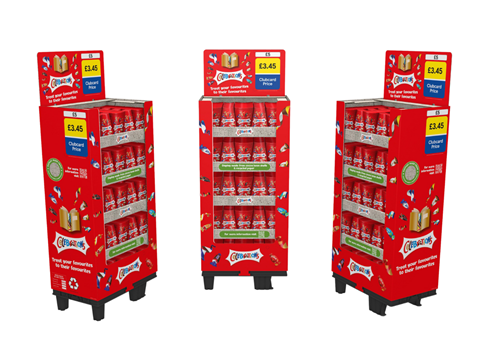
Mars Wrigley and Tesco are trialling a new display made from waste cocoa bean shells and recycled paper, apparently negating the need for virgin tree fibres and reducing the greenhouse gas emissions of conventional cardboard by 30%.
Developed in collaboration with Medoola and Kolorcraft through TMS, the Cocoa Cardboard corrugated card fibre is also said to reduce land usage by 94% and water usage by 59%, according to a full life cycle assessment (LCA). Furthermore, it claims to be fully recyclable via standard recycling streams.
Adam Grant, UK general manager at Mars Wrigley, comments: “Cocoa Cardboard represents the next stage in our commitment to reach Net Zero by 2050 and reduce our Green House Gas emissions. We have a huge sustainability focus at Mars Wrigley, driven by our Sustainable in a Generation plan, and it extends into our manufacturing and supply chain, too.
“Our vision is to create a new display material that has all the benefits of cardboard but with enhanced credentials. The development of Cocoa Cardboard will enable us to drive the efficiency and effectiveness of display materials in a more circular way, benefiting our customer partners, consumers and the planet.”
This trial marks the second stage of the pilot, with 1,200 solid board display units made of Cocoa Cardboard being trialled at Tesco stores in 2021. The learnings acquired are set to contribute to the 2024 trial, as a total of 765 Cocoa Cardboard display units are implemented into Tesco stores across Scotland, England and Wales.
Scotland will launch its 75 pairs of display units from 17th June; the remaining 690 will make their debut in England and Wales from 3rd July. All will be branded with the Celebrations ‘Gift For Teacher’ promotion.
Trialling Cocoa Cardboard is expected to contribute to Mars’ wider commitments to halving greenhouse gas emissions by 2030 and become a Net Zero business by 2050.
Back in 2022, Lay’s crisps sold across Europe were sold on display stands made entirely from unsorted household waste in a collaboration between UBQ Materials and PepsiCo. Every ton of material produced was thought to save up to 12 tons of greenhouse gases that would otherwise enter landfills or incineration.
Nestlé Česko, PENNY, and POSpooling subsequently joined forces in 2023 to pilot point-of-sale stands made of wire. As opposed to cardboard alternatives, which were said to be thrown away after two weeks of use in retail settings, the wire alternatives were said to cut down on environmental burden by five times.
If you liked this story, you might also enjoy:
How are the top brands progressing on packaging sustainability?
The ultimate guide to global plastic sustainability regulation














No comments yet